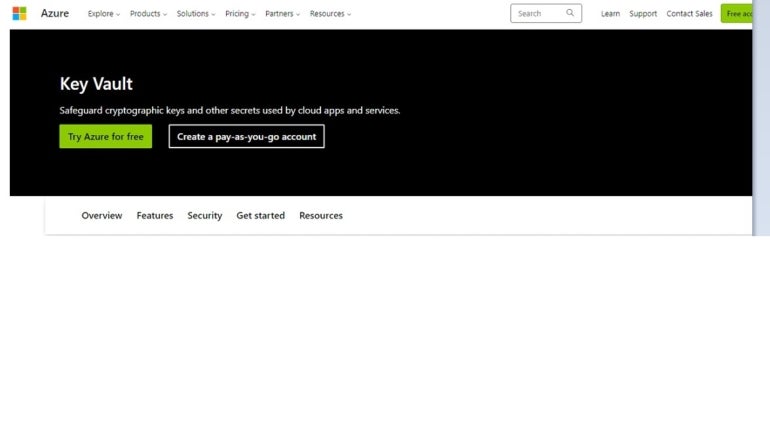
Using SSH and encrypting your data are the biggest steps organizations can take to ensure that all their private information remains safe and secure and away from prying eyes. However, there are challenges with managing encryption.
First, losing encryption keys means losing access to data. Second, if a malicious actor gets hold of an organization’s keys, data becomes vulnerable and subject to cyber threats like hacking and ransomware – no matter how strong the encryption.
Fortunately, there are a number of tools available that provide encryption key management, keeping keys both secure and easily accessible.
Here are five of the most popular, reliable, and effective encryption key management tools and their features so you can decide which one best fits your needs.
Jump To:
| Software | Pricing | Pros | Cons |
|---|---|---|---|
| Microsoft Azure Key Vault: Best overall | Per Microsoft: “Operations against all keys (software-protected keys and HSM-protected keys), secrets, and certificates are billed at a flat rate of $0.03 per 10,000 operations, except certificate renewal requests, which are billed at a rate of $3 per renewal.” | ||
| GnuPG: Best for PGP encryption | Free |
|
|
| Seahorse: Best for a user-friendly interface | Free | ||
|
Google Cloud Key Management: Best for a cloud-based option |
Contact Google for pricing |
|
|
|
HashiCorp Vault: Best for secret keys |
Free for limited features, then starts at $1.58 per hour |
|
Microsoft also offers a very impressive encryption key management service in the form of Azure Key Vault, with its focus on security and automation.
Azure Key Vault allows for importing and generating encryption keys, including those linked to hardware security modules, and to easily monitor and audit their use. These keys stay protected at all times, not even Microsoft itself can access them. As is the focus of a lot of Microsoft’s Azure line, there are plenty of options to simplify and automate Key Vault’s functions, potentially freeing up a lot of time.
Azure Key Vault is offered on a pay-as-you-go basis, but Microsoft offers you $200 of credit to use in your first 30 days, and will continue to give you a free monthly allowance on over 55 of their services as long as you’re with them. This means it won’t cost you anything to try this enterprise-level encryption key management system, though long-term costs will vary depending on how much you use each service.
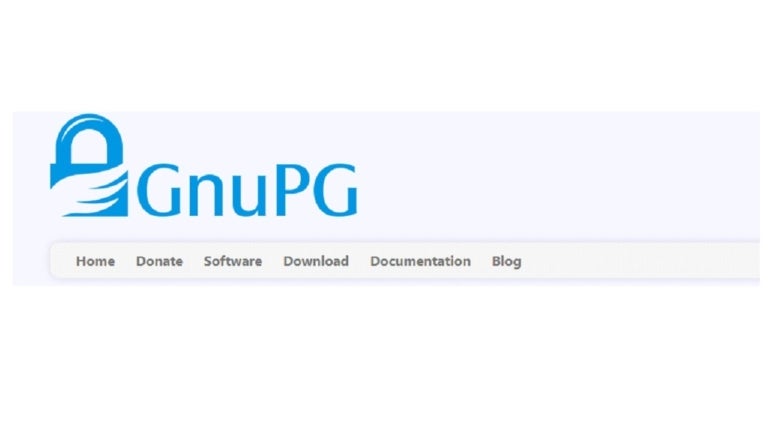
GnuPG, or the GNU Privacy Guard, is a free and open-source command line tool that allows for encryption key management as well as easy encryption and signing of data, emails and other communication.
Although it doesn’t carry as many features as some other key management and encryption packages, it will be more than sufficient for most and more than earns its spot on this list. As a common inclusion on Linux distributions, it’s a very accessible option that is easy to use, provided you can get past the potential intimidation of operating from the command line. Being as widely used as it is and having been around for over 20 years, there are plenty of support options.
As well as easy integration with other common applications, GnuPG also works well with Windows through Gpg4win. This allows for quick and easy setup and additional features such as a context menu tool and a Microsoft Outlook plugin which allows you to easily use your keys for sending and receiving encrypted emails. Thanks to a recent update, GnuPG version two now has S/MIME functionality.
Free.
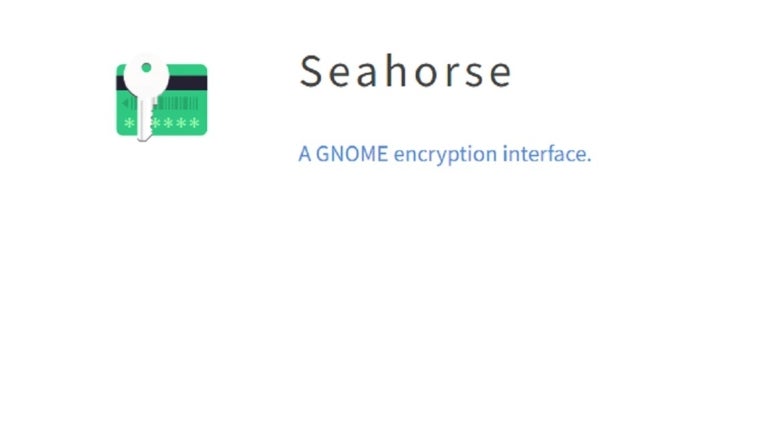
Seahorse is another local encryption key management application that, like GnuPG, is often found on Linux distributions. However, Seahorse offers a larger range of features as well as a graphical user interface, which many will find more comfortable than working with the command line.
As well as allowing you to manage both PGP and SSH encryption keys, Seahorse can manage your other passwords and even allows the use of an image as a photo ID. The interface is easy to use and understand, making adding, removing or updating keys and passwords a quick and easy process, even for those who are not overly technical. The option to back up your keyring is also included, reducing the risk of accidentally losing access to your data.
Integration with other common Linux software including file managers, browsers and email clients combined with passphrase caching makes for a very smooth user experience, though this does mean that you need to take care not to leave your computer unlocked.
Best of all, it is available as a free and open-source product, so there are no upfront costs or subscription fees.
SEE: Asymmetric vs symmetric encryption
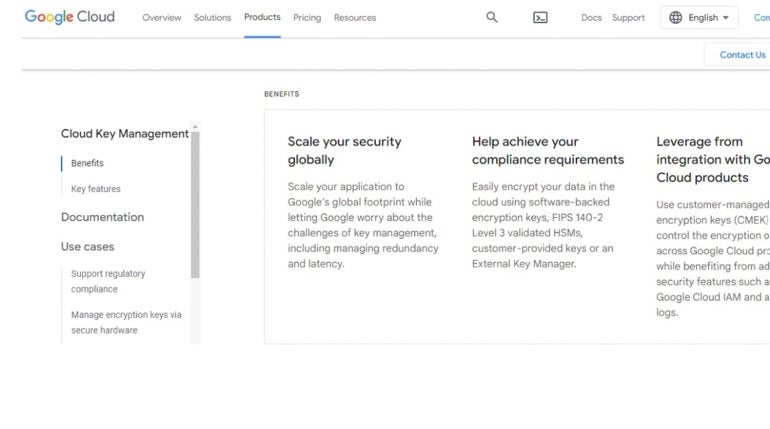
Google has long been one of the biggest names in tech and the Google Cloud Key Management service builds on the company’s history of offering reliable solutions that meet the needs of just about anyone.
This is a centralized, cloud-based key management service that can truly take care of everything. It’s able to generate, store, rotate and destroy both symmetric and asymmetric keys for many different encryption systems, including AES256, RSA 4096, and EC P384. Google Cloud also includes the ability to work with external key managers and hardware-based encryption via HSM for ultimate security.
Users should be aware that this is a subscription service with a fairly complex pricing system, with the monthly cost being determined by your usage of the various functions it offers. Although the pricing is reasonable, it may still be off-putting if you like to know in advance exactly how much you’ll be spending. However new users are offered a promotional amount of $350 to spend on Google Cloud products.
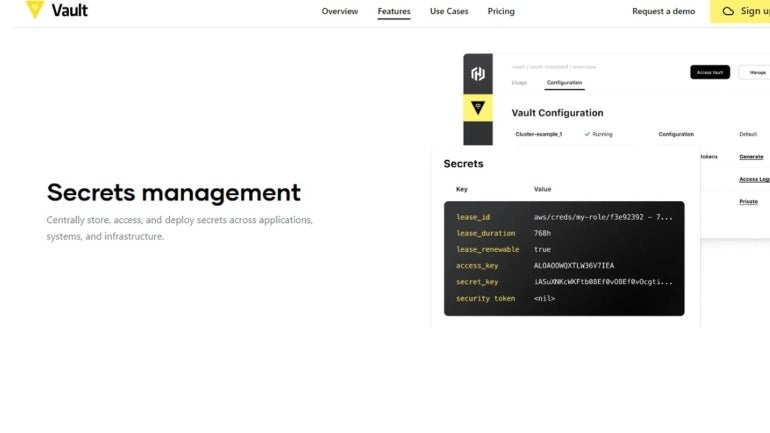
HashiCorp Vault is an ideal encryption manager to use for secrets management – secrets being any digital asset an organization wants under tight control. It offers a plethora of features, such as identity-based access and more.
Seamless integration with other software and service providers including Google, Microsoft, and Amazon Web Services is another feature.
While HashiCorp Vault is a freemium service, you’ll need to subscribe if you want full access to their identity-based security services, including encryption keys. The exact price you’ll pay varies, with their standard service starting at $1.58 per hour. Custom setups are also available if you have special security or compliance needs, with more information about what they can offer in this regard available from their sales team.
There are a few things to consider when choosing an encryption key management solution:
Look for a management system that has strong encryption algorithms and safe key storage. Another great feature to look for is key rotation to ensure that your keys are cycled.
It’s also important to ensure that your key management system will integrate with your existing applications.
The truth is that cost plays an important role when vetting key management systems. However, you should never base your decision purely on pricing. Make sure that the option you choose is best suited to your needs. Fortunately, you will find a number of free tools in the list above, but you should always check that the software solution offers the kind of functionality you’re looking for.
When choosing software to manage cryptographic keys, you will also need to think about cloud-based versus. physical storage. This is primarily a preference-based choice, as some find peace of mind in choosing a local storage solution as opposed to a cloud-based one. Still, cloud-based systems can also provide greater accessibility, so it’s something worth considering.
Encryption key software is a system that creates, manages, and uses cryptographic keys to encrypt and decrypt sensitive data. These keys are critical for protecting online data. The software ensures that encrypted data is unreadable by unauthorized users, protecting it from potential cyber-attacks.
It also ensures the safe key storage, distribution, and rotation of keys, which is critical for ensuring the integrity and confidentiality of information across several applications and systems.
Here are some of the most important features to look for when choosing the right software solution to manage encryption keys:
Encryption key management software and cloud-based services can help to ensure confidentiality so that only authorized persons can gain access to sensitive information. It also maintains the integrity of data, as it prevents tampering and makes data accessible through the use of encryption keys.
Cryptographic operations also help to maintain online security by preventing data breaches and cyber-attacks.
What Is Key Management in Encryption?
Encryption key management is the term used to describe the administration of the methods and policies used to organize, safeguard, store, and distribute keys.
What are 3 types of encryption keys?
The three types of encryption keys are as follows:
⦁ Symmetric encryption keys. These keys are used in symmetric encryption, which employs the usage of the same key for both encryption and decryption. It is a quick and effective solution, but it requires safe key delivery.
⦁ Asymmetric keys. Asymmetric encryption uses two keys: a public key for encryption and a private key for decryption. The public key can be freely distributed, whereas the private key has to be kept hidden, resulting in a more secure key exchange method.
⦁ Hashing. Hashing generates a fixed-size number from data using a one-way function to ensure that it remains authentic and integral. While not used for encryption, these keys are essential for message authentication and digital signatures.
What are the most secure encryption techniques?
The most secure techniques for encryption include:
⦁ RSA (Rivest-Shamir-Adleman). An asymmetric encryption technique that is commonly used for the safe exchange of keys and electronic signatures. This method relies on the mathematical features of prime numbers.
⦁ ECC (Elliptic Curve Cryptography). This is also an asymmetric encryption technique that offers comparable safety with lower key lengths, which makes it more efficient in cases where there are limited resources.
⦁ AES (Advanced Encryption Standard). This method uses symmetric encryption key lengths of 256, 128, or 192 bits that have become the standard in the industry for safeguarding private information with encryption, thanks to its speed and reliability.
⦁ SHA-3 (Secure Hash Algorithm 3). Unlike the other three, SHA-3 is a hash function employed for digital signatures along with data verification to prevent collision attacks and ensure the integrity of the data.
With Graylog, you get the key features you need to maintain a robust security posture. Graylog is a scalable, flexible log management and cybersecurity platform that combines SIEM, security analytics, industry-leading anomaly detection capabilities with machine learning. Built by practitioners for practitioners, Graylog Security flips the traditional SIEM application on its head by stripping out the complexity, alert noise, and high costs.
Dashlane Password Manager provides companies with everything they need to onboard new employees, manage permissions and monitor security issues all from one place. It also includes advanced features such as SAML-based single sign-on (SSO) and the company’s security architecture has never been hacked. Try Dashlane Business for free for 14 days
Endpoint Central is one super app to manage your enterprise IT, from endpoint management to end-user security. Streamline and scale every IT operation from device enrolling/onboarding to retiring for multiple device types across different platforms. Perform patching, distribute software, manage mobile devices, deploy OS, keep track of hardware/software inventory, and remotely troubleshoot end-user issues while shielding them from cyberattacks. Get a free 30-day trial on unlimited endpoints.
Read next: What is cloud security?